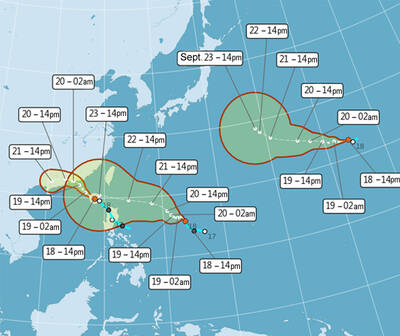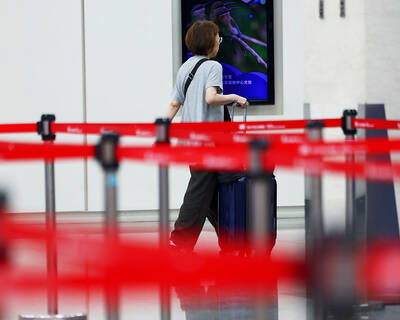Whether China’s economic development will lead to democratization hinges on how Beijing tackles its increasing social instability, a local expert on Chinese affairs said at an international forum yesterday.
Ming Chu-cheng (明居正), a political science professor at National Taiwan University, said the real number of incidents of social unrest outnumbered those recorded in official data, adding that the number of incidents were growing between 18 percent and 25 percent a year.
“I suspect China will see a lot of conflict over the next five years,” Ming said. “They could be as dramatic as those that happened in Eastern Europe or the Soviet Union. It would be hard to imagine what would happen should large-scale social unrest occur.”
Ming made the remarks during the final day of the International Seminar on China’s 30 Years of Economic Policy Reform. The two-day event was organized by the Chung-Hua Institution for Economic Research and the Mainland Affairs Council.
Taiwan saw social unrest under the former Chinese Nationalist Party (KMT) administration, Ming said, but the authoritarian regime opted to make concessions and democratize.
“Heavy-handed suppression can maintain social order for a while, but it does not last long,” he said. “Eastern Europe and the Soviet Union are two perfect examples.”
It took two years for the Soviet Union to collapse and it took Romania only 10 days, Ming said, adding that public displeasure was the main cause of their downfall.
“The accumulated power of public discontent must not be ignored,” he said. “I firmly believe totalitarianism is doomed to fail. Problems are bound to occur when political rule clashes with human nature, and China is no exception.”
Chen Chih-jou (陳志柔), a sociology researcher at the Institute of Sociology of the Academia Sinica, said that his study showed that China’s social disturbances would not lead to its collapse or democratization.
Chen, however, said that the data he relied on for his study were unreliable.
Yuan Zhijia (苑志佳), an economics professor at Rissho University in Tokyo, said that China may follow the development model of Asia’s four economic “tigers”: Hong Kong, Singapore, South Korea and Taiwan.
In other words, China’s economy will continue to grow under authoritarianism, Yuan said. It remains to be seen, however, whether economic development will lead to democratization, he said. He said that China was likely to develop into a country with a complete market economy in the near future.
Yuan said it was hard to predict what kind of capitalism China’s economy would develop into, as countries have different models because of their unique histories.
The US and the UK have “market capitalism” with the government acting as an “invisible hand” in the free and competitive market. France and Germany have “state-led capitalism” where the market economy and the role of government are equally important. Japan and South Korea have so-called “big business-based capitalism,” in which large business conglomerates play the dominating role.
Sweden’s capitalism is “social democratic capitalism” where there are high welfare, strong human rights and high taxes, Yuan said.

NEW AGREEMENT: Malaysia approved imports last year after nearly two years of negotiations and inspections to meet quarantine requirements, officials said Up to 3.6 tonnes of pomeloes from Taiwan cleared Malaysian customs on Friday, in the first shipment of Taiwanese pomeloes to Malaysia. Taiwan-grown pomeloes are popular in domestic and overseas markets for their tender and juicy taste, the Ministry of Agriculture’s Animal and Plant Health Inspection Agency said. The fruit is already exported to Japan, Canada, Hong Kong, Singapore and the Philippines, it added. The agency began applying for access to the Malaysian market in 2023, compiling data on climate suitability, pests and diseases, and post-harvest handling, while also engaging in nearly two years of negotiations with Malaysian authorities and submitting supplementary

PEAK MONTHS: Data showed that on average 25 to 27 typhoons formed in the Pacific and South China seas annually, with about four forming per month in July and October One of three tropical depressions in the Pacific strengthened into a typhoon yesterday afternoon, while two others are expected to become typhoons by today, Central Weather Administration (CWA) forecaster Lee Ming-hsiang (李名翔) said yesterday. The outer circulation of Tropical Depression No. 20, now Typhoon Mitag, has brought light rain to Hualien, Taitung and areas in the south, Lee said, adding that as of 2pm yesterday, Mitag was moving west-northwest at 16kph, but is not expected to directly affect Taiwan. It was possible that Tropical Depression No. 21 would become a typhoon as soon as last night, he said. It was moving in a

Tigerair Taiwan and China Airlines (CAL) today announced that several international flights were canceled or rescheduled due to Typhoon Ragasa. The Central Weather Administration (CWA) has maintained sea and land warnings for the typhoon. Its storm circle reached the Hengchun Peninsula (恆春半島) on Taiwan's southern tip at 11am today. Tigerair Taiwan said it canceled Monday's IT551/IT552 Taoyuan-Da Nang, IT606/IT607 Taoyuan-Busan and IT602 Taoyuan-Seoul Incheon flights. Tomorrow, cancelations include IT603 Seoul Incheon-Taoyuan, as well as flights between Taoyuan and Sapporo, Osaka, Tokyo Narita, Okinawa, Fukuoka, Saga, Tokyo Haneda, Nagoya, Asahikawa and Jeju. On Wednesday, the IT321/IT322 Kaohsiung-Macau round-trip would also be canceled. CAL announced that today's

About nine Taiwanese are “disappeared,” detained, or otherwise deprived of freedom of movement in China each month, the Mainland Affairs Council (MAC) said yesterday. Between Jan. 1 last year and Aug. 31 this year, 188 Taiwanese travelers went missing, were detained and interrogated, or had their personal freedom restricted, with some questioned in airports or hotel lobbies, the council said. In a statement ahead of the Mid-Autumn Festival, the council urged people visiting China for any reason to be highly vigilant and aware of the risks. Of the reported cases, 50 people were “disappeared” after entering China, 19 were detained and 119 had